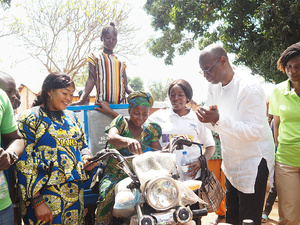Liberia - work on camp for Ivorian refugees continues
Liberia - work on camp for Ivorian refugees continues
The first phase of work on the refugee camp in Bahn which included identification, measurement and clearing of a camp site in a remote part of eastern Liberia is complete. The initial phase of work proved more challenging than expected. It took some 200 local men with machetes and machines over three weeks to clear some 80 hectares of jungle for the site. The arrival of UNHCR heavy machinery - a bulldozer and a compactor from Sierra Leone have helped to pick up pace.
The construction of the camp's main reception centre is starting this week. The centre will have 14 shelters with capacity of 500 refugees at a time. Other camp facilities will include latrines, showers, security, registration and distribution sites, kitchen, canteen, warehouse, medical screening clinic, water wells and offices. UNHCR has also contracted local builders to help construct facilities in the camp. The first Ivorian refugees will be settled as soon as the basic facilities and services are in place.
It's estimated Liberia now hosts more than 30,000 refugees who fled post election violence and tensions in Cote d'Ivoire. Many cross into Liberia through the forests avoiding busy roads and official border crossings. Ivorian refugees are being hosted in more than 20 villages scattered around the town of Saclepea in Nimba County. Their Liberian hosts share with them houses and existing facilities, including schools and health centres.
Many Liberians still remember their years as refugees in Cote d'Ivoire. Others share the same culture, most of the time speak the same language, have the same beliefs. Though resources are scarce, people share what they have with refugees, particularly when they consider them as "brothers" and "sisters".
UNHCR has also started distributions of food and relief items to refugees living in the local communities. These efforts are being hindered by the rainy season and extremely bad road conditions leading to the host communities.






